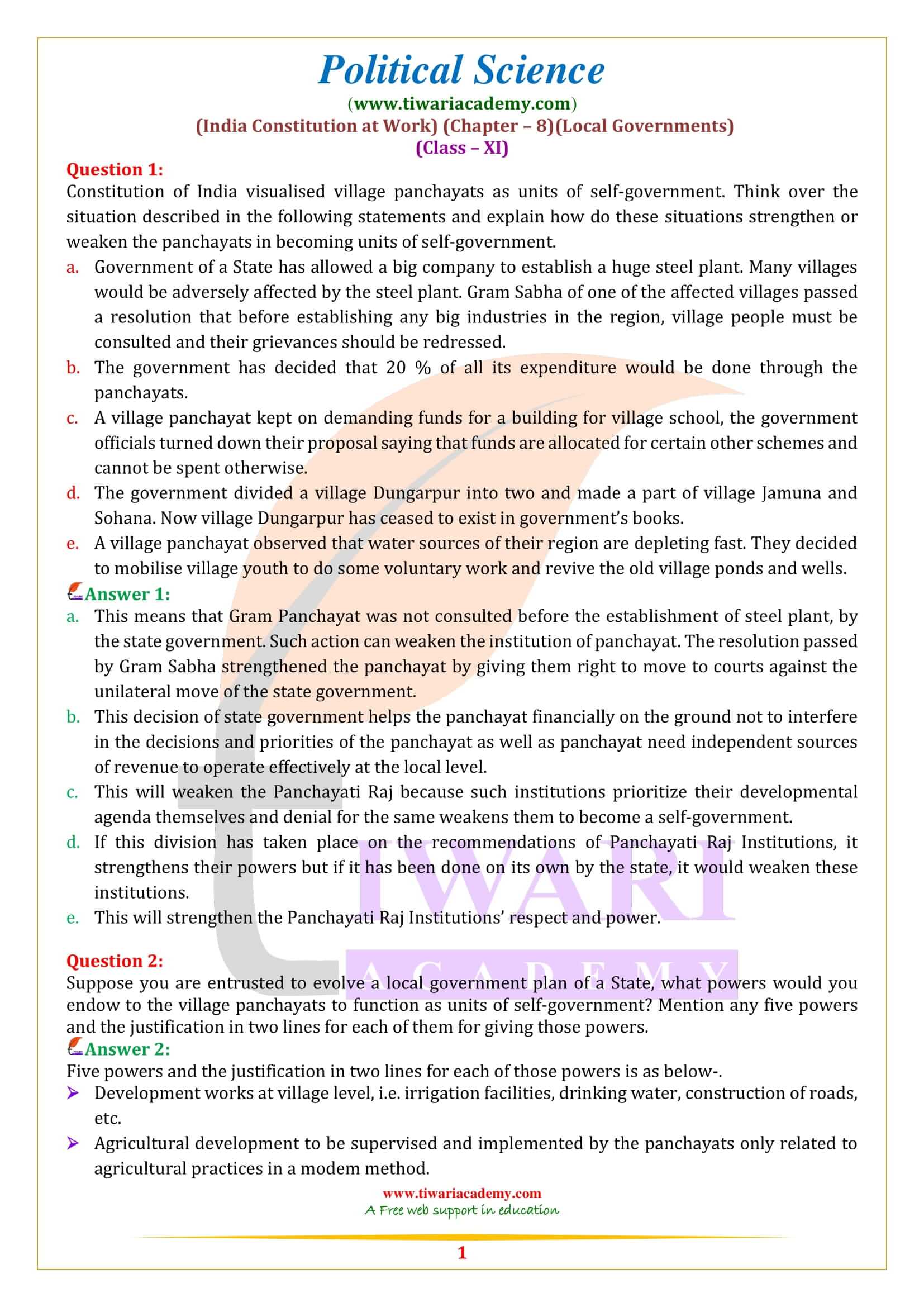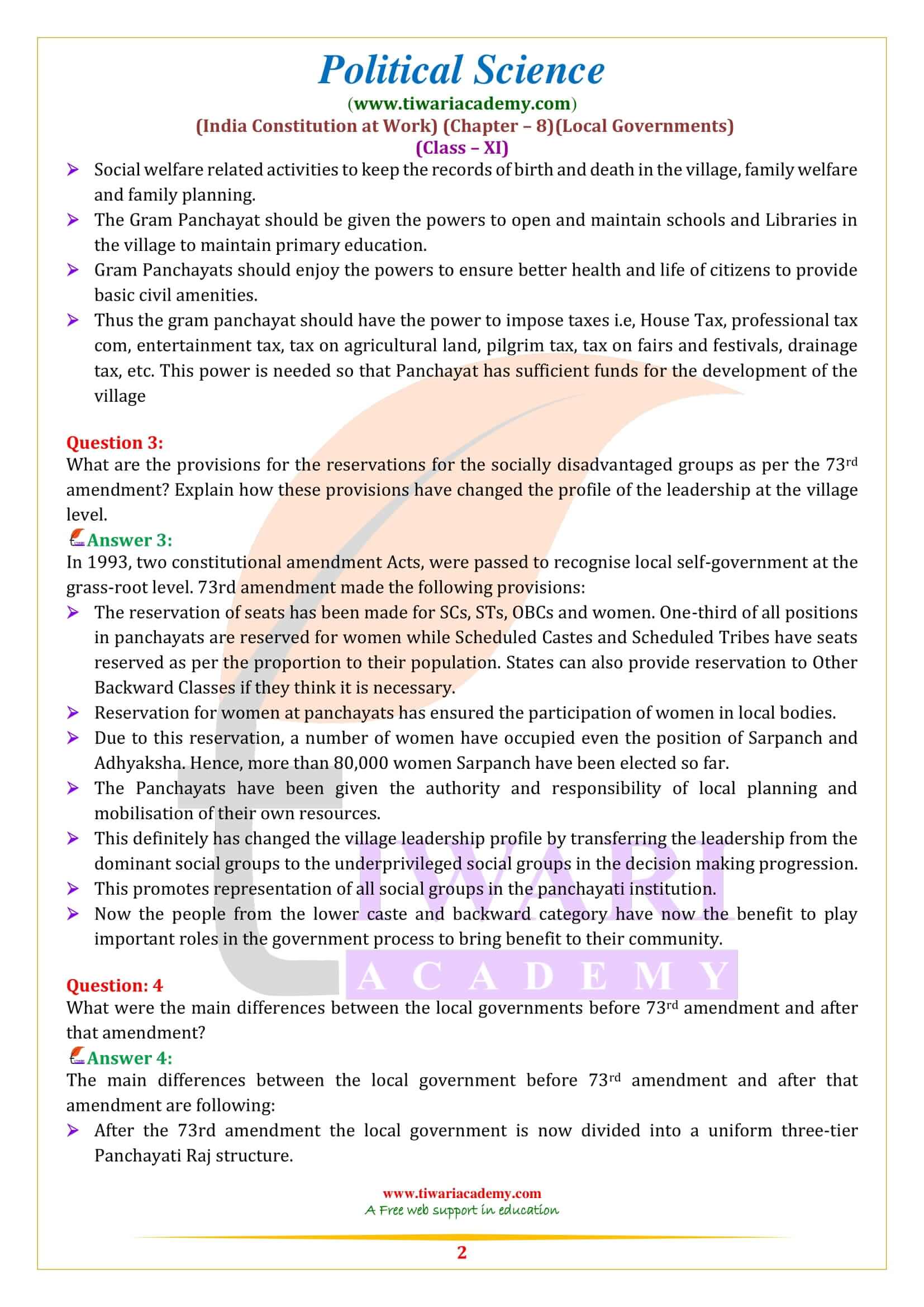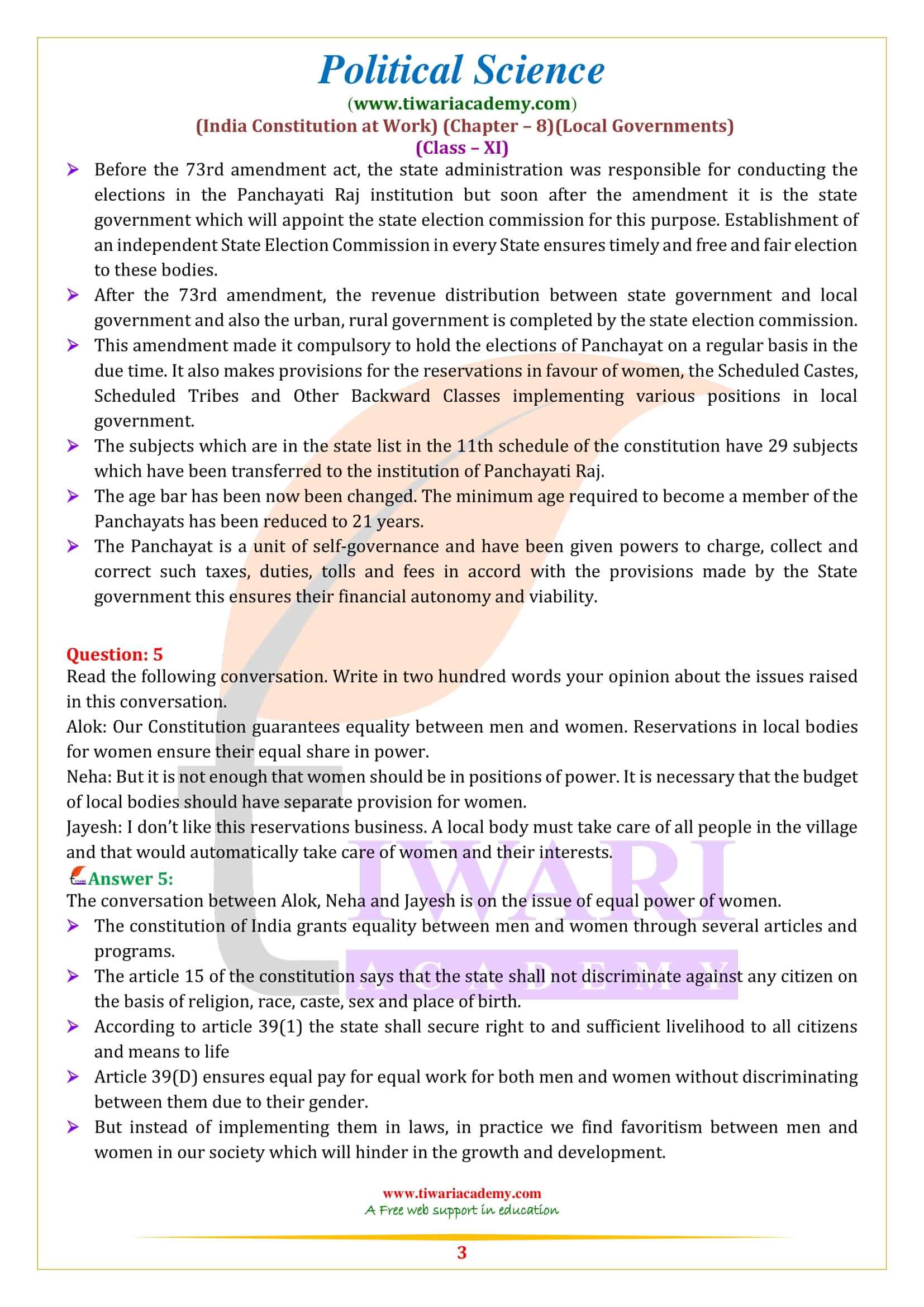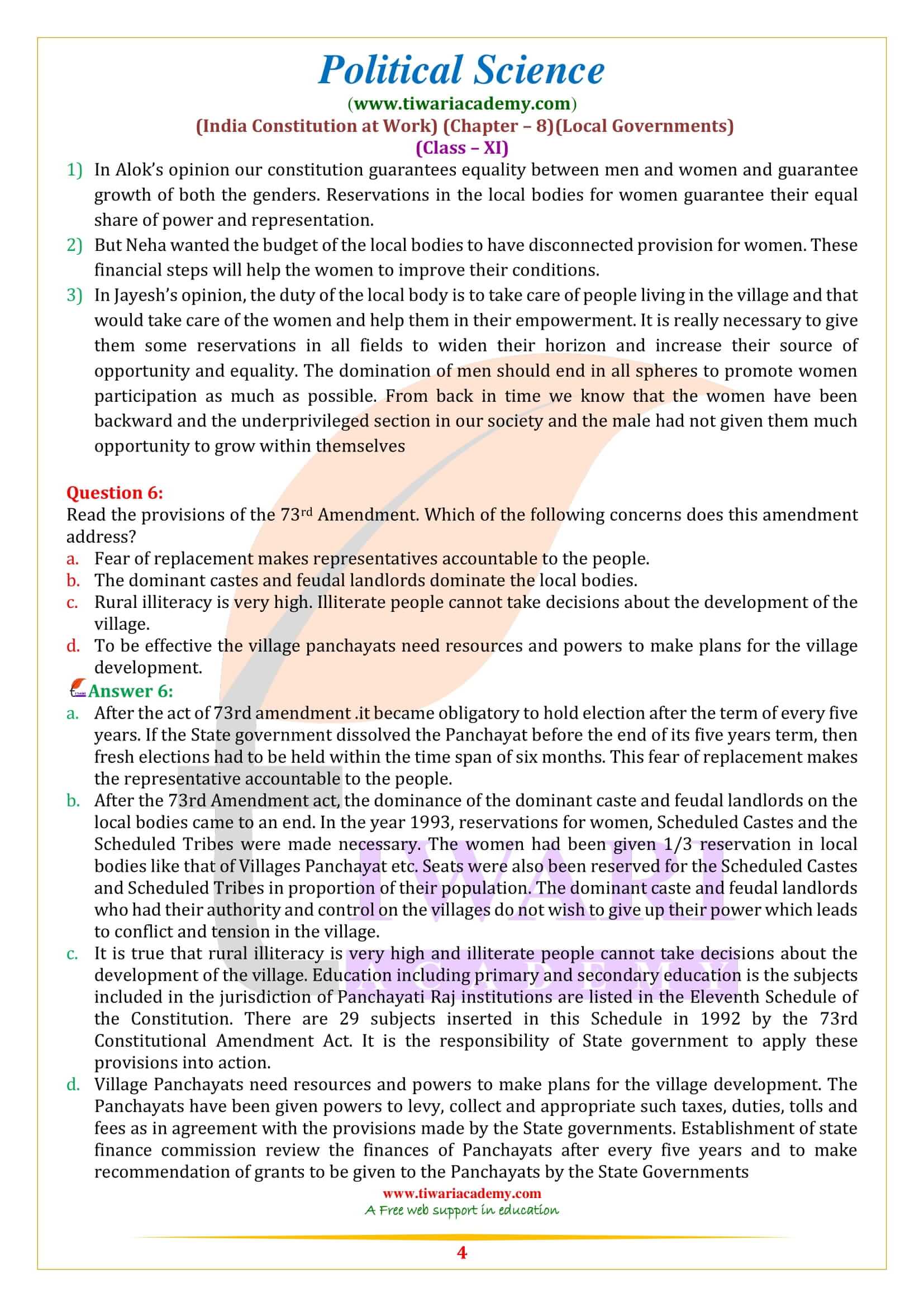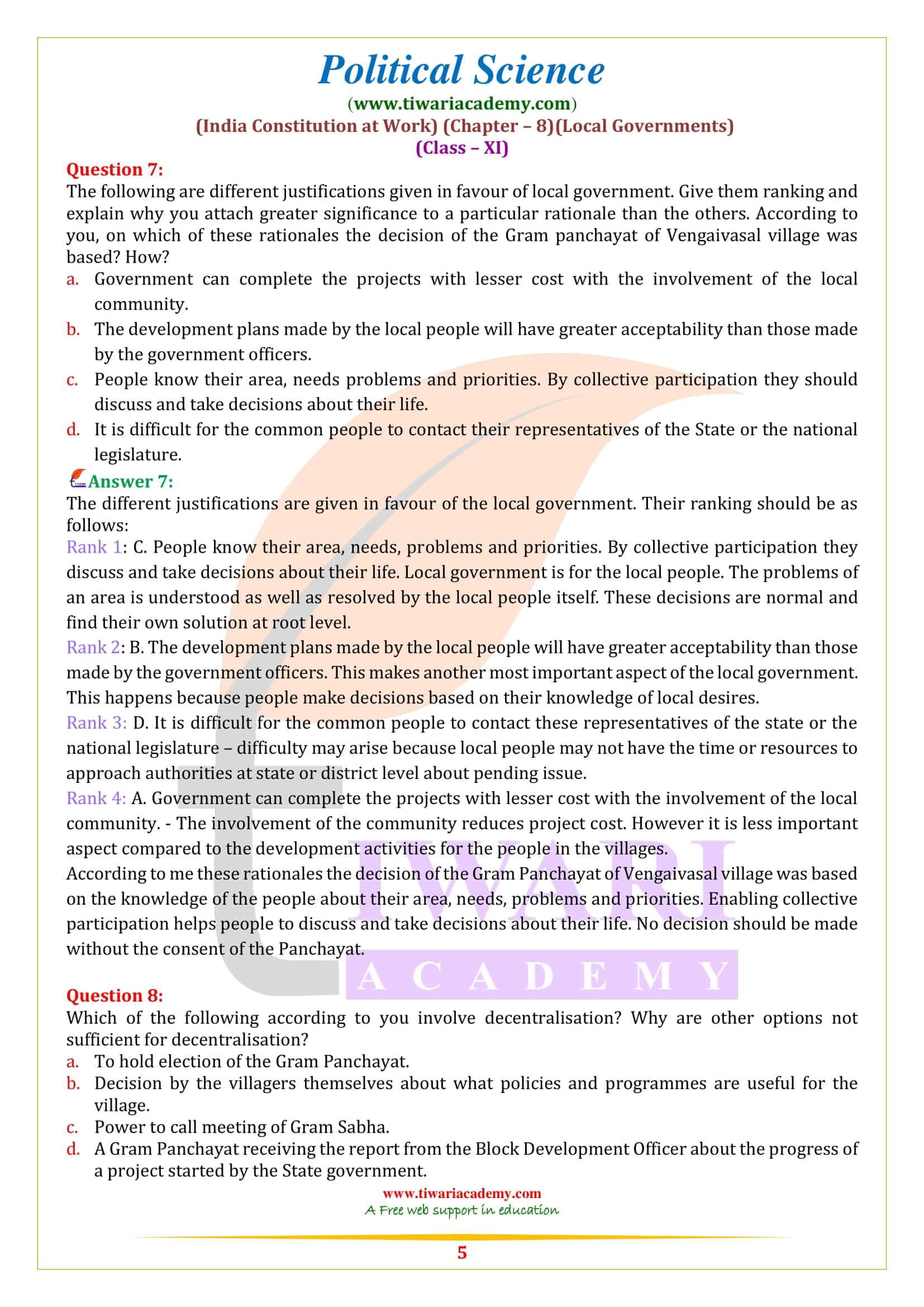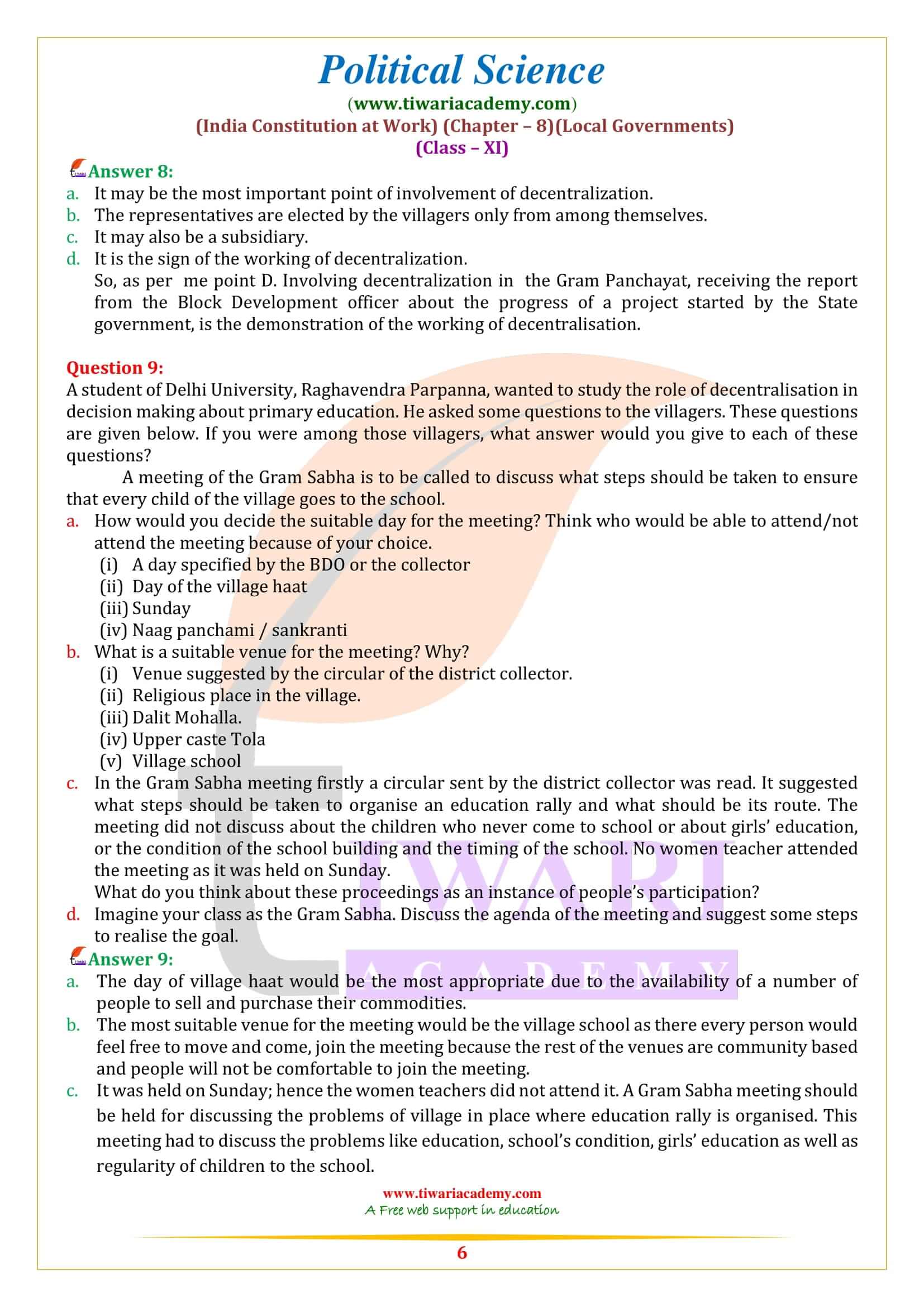NCERT Solutions for Class 11 Political Science Chapter 8 Local Governments in Hindi and English Medium updated and prepared for CBSE session 2025-26. All the question-answer of 11th Political Science chapter 8 of Indian Constitution at Work are given here in easy to learn format.
NCERT Solutions for Class 11 Political Science Chapter 8
Suppose you are entrusted to evolve a local government plan of a State, what powers would you endow to the village panchayats to function as units of self-government? Mention any five powers and the justification in two lines for each of them for giving those powers.
Five powers and the justification in two lines for each of those powers is as below:
- Development works at village level, i.e. irrigation facilities, drinking water, construction of roads, etc.
- Agricultural development to be supervised and implemented by the Panchayats only related to agricultural practices in a modem method.
- Social welfare related activities to keep the records of birth and death in the village, family welfare and family planning.
- The Gram Panchayat should be given the powers to open and maintain schools and Libraries in the village to maintain primary education.
- Gram Panchayats should enjoy the powers to ensure better health and life of citizens to provide basic civil amenities.
- Thus the gram Panchayat should have the power to impose taxes i.e, House Tax, professional tax com, entertainment tax, tax on agricultural land, pilgrim tax, tax on fairs and festivals, drainage tax, etc. This power is needed so that Panchayat has sufficient funds for the development of the village
What are the provisions for the reservations for the socially disadvantaged groups as per the 73rd amendment? Explain how these provisions have changed the profile of the leadership at the village level.
In 1993, two constitutional amendment Acts, were passed to recognise local self-government at the grass-root level. 73rd amendment made the following provisions:
- The reservation of seats has been made for SCs, STs, OBCs and women. One-third of all positions in panchayats are reserved for women while Scheduled Castes and Scheduled Tribes have seats reserved as per the proportion to their population. States can also provide reservation to Other Backward Classes if they think it is necessary.
- Reservation for women at panchayats has ensured the participation of women in local bodies.
- Due to this reservation, a number of women have occupied even the position of Sarpanch and Adhyaksha. Hence, more than 80,000 women Sarpanch have been elected so far.
- The Panchayats have been given the authority and responsibility of local planning and mobilisation of their own resources.
- This definitely has changed the village leadership profile by transferring the leadership from the dominant social groups to the underprivileged social groups in the decision making progression.
- This promotes representation of all social groups in the panchayati institution.
- Now the people from the lower caste and backward category have now the benefit to play important roles in the government process to bring benefit to their community.
What were the main differences between the local governments before 73rd amendment and after that amendment?
The main differences between the local government before 73rd amendment and after that amendment are following:
- After the 73rd amendment the local government is now divided into a uniform three-tier Panchayati Raj structure.
- Before the 73rd amendment act, the state administration was responsible for conducting the elections in the Panchayati Raj institution but soon after the amendment it is the state government which will appoint the state election commission for this purpose. Establishment of an independent State Election Commission in every State ensures timely and free and fair election to these bodies.
- After the 73rd amendment, the revenue distribution between state government and local government and also the urban, rural government is completed by the state election commission.
- This amendment made it compulsory to hold the elections of Panchayat on a regular basis in the due time. It also makes provisions for the reservations in favour of women, the Scheduled Castes, Scheduled Tribes and Other Backward Classes implementing various positions in local government.
- The subjects which are in the state list in the 11th schedule of the constitution have 29 subjects which have been transferred to the institution of Panchayati Raj.
- The age bar has been now been changed. The minimum age required to become a member of the Panchayats has been reduced to 21 years.
- The Panchayat is a unit of self-governance and have been given powers to charge, collect and correct such taxes, duties, tolls and fees in accord with the provisions made by the State government this ensures their financial autonomy and viability.
Read the following conversation. Write in two hundred words your opinion about the issues raised in this conversation.
Alok: Our Constitution guarantees equality between men and women. Reservations in local bodies for women ensure their equal share in power.
Neha: But it is not enough that women should be in positions of power. It is necessary that the budget of local bodies should have separate provision for women.
Jayesh: I don’t like this reservations business. A local body must take care of all people in the village and that would automatically take care of women and their interests.
Answer:
The conversation between Alok, Neha and Jayesh is on the issue of equal power of women.
a). The constitution of India grants equality between men and women through several articles and programs.
b). The article 15 of the constitution says that the state shall not discriminate against any citizen on the basis of religion, race, caste, sex and place of birth.
c). According to article 39(1) the state shall secure right to and sufficient livelihood to all citizens and means to life
d). Article 39(D) ensures equal pay for equal work for both men and women without discriminating between them due to their gender.
e). But instead of implementing them in laws, in practice we find favoritism between men and women in our society which will hinder in the growth and development.
- In Alok’s opinion our constitution guarantees equality between men and women and guarantee growth of both the genders. Reservations in the local bodies for women guarantee their equal share of power and representation.
- But Neha wanted the budget of the local bodies to have disconnected provision for women. These financial steps will help the women to improve their conditions.
- In Jayesh’s opinion, the duty of the local body is to take care of people living in the village and that would take care of the women and help them in their empowerment. It is really necessary to give them some reservations in all fields to widen their horizon and increase their source of opportunity and equality. The domination of men should end in all spheres to promote women participation as much as possible. From back in time we know that the women have been backward and the underprivileged section in our society and the male had not given them much opportunity to grow within themselves
